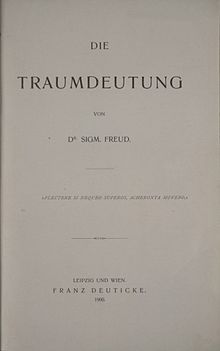Interpretation of Dreams

Title page of the original German edition
|
|
| Author | Sigmund Freud |
|---|---|
| Original title | Die Traumdeutung |
| Translator |
A. A. Brill (first version) James Strachey (authorized version) Joyce Crick (most recent version) |
| Country | Austria |
| Language | German |
| Subject | Dream interpretation |
| Publisher | Franz Deuticke, Leipzig & Vienna |
|
Publication date
|
November 4, 1899 (dated 1900) |
|
Published in English
|
1913 (Macmillan, translation of the German third edition) |
| Media type | |
The Interpretation of Dreams (German: Die Traumdeutung) is an 1899 book by psychoanalyst Sigmund Freud, in which Freud introduces his theory of the unconscious with respect to dream interpretation, and discusses what would later become the theory of the Oedipus complex. Freud revised the book at least eight times and, in the third edition, added an extensive section which treated dream symbolism very literally, following the influence of Wilhelm Stekel. Freud said of this work, "Insight such as this falls to one's lot but once in a lifetime."
The book was first published in an edition of 600 copies, which did not sell out for eight years. The Interpretation of Dreams later gained in popularity, and seven more editions were published in Freud's lifetime.
Because of the book's length and complexity, Freud also wrote an abridged version called On Dreams. The original text is widely regarded as one of Freud's most significant works.
Freud spent the summer of 1895 at Schloss BelleVue near Grinzing in Austria, where he began the inception of The Interpretation of Dreams. In a 1900 letter to Wilhelm Fliess, he wrote in commemoration of the place:
"Do you suppose that some day a marble tablet will be placed on the house, inscribed with these words: 'In this house on July 24, 1895, the secret of dreams was revealed to Dr. Sigm. Freud'? At the moment I see little prospect of it." — Freud in a letter to Wilhelm Fliess, June 12, 1900
While staying at Schloss Bellevue, Freud dreamed his famous dream of 'Irma's injection'. His reading and analysis of the dream allowed him to be exonerated from his mishandling of the treatment of a patient in 1895. In 1963, Belle Vue manor was demolished, but today a memorial plaque with just that inscription has been erected at the site by the Austrian Sigmund Freud Society.
Dreams, in Freud's view, are all forms of "wish fulfillment" — attempts by the unconscious to resolve a conflict of some sort, whether something recent or something from the recesses of the past (later in Beyond the Pleasure Principle, Freud would discuss dreams which do not appear to be wish-fulfillment). Because the information in the unconscious is in an unruly and often disturbing form, a "censor" in the preconscious will not allow it to pass unaltered into the conscious. Freud introduced the term 'manifest content' to describe what the dream recalled.
...
Wikipedia
